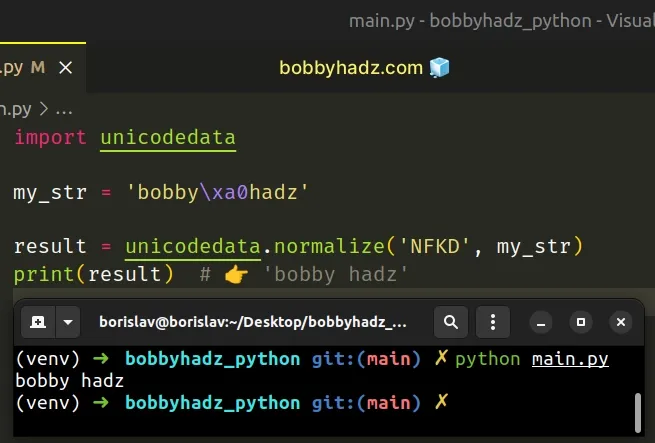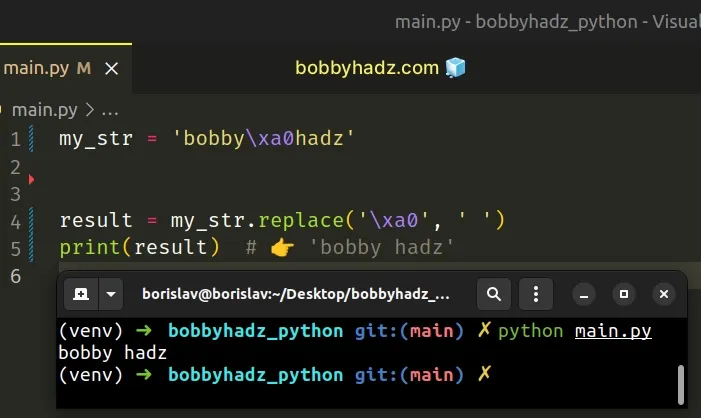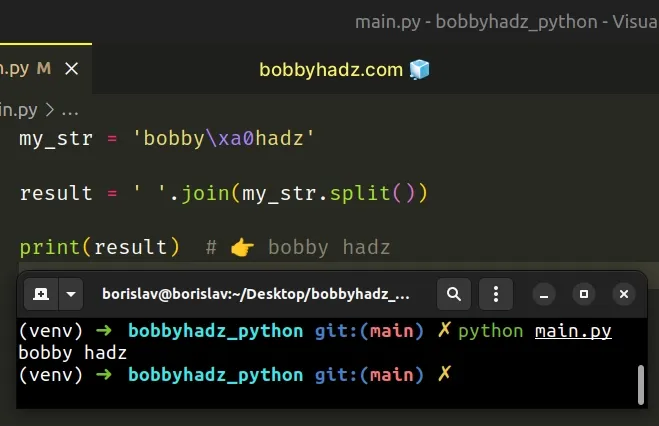How to Remove \xa0 from a String in Python
Last updated: Apr 9, 2024
Reading time·4 min

# Table of Contents
- Remove \xa0 from a string in Python
- Remove \xa0 from a string using str.replace()
- Remove \xa0 from a string using split() and join()
- Remove \xa0 from a string using BeautifulSoup
- Remove \xa0 from a List of Strings in Python
# Remove \xa0 from a string in Python
Use the unicodedata.normalize() method to remove \xa0 from a string.
The unicodedata.normalize method returns the normal form for the provided
Unicode string by replacing all compatibility characters with their
equivalents.
import unicodedata my_str = 'bobby\xa0hadz' result = unicodedata.normalize('NFKD', my_str) print(result) # 👉️ 'bobby hadz'

\xa0 character represents a non-breaking space, so the way to remove it from a string is to replace it with a space.The unicodedata.normalize() method returns the normal form for the provided Unicode string.
The first argument is the form - NFKD in our case. The normal form NFDK
replaces all compatibility characters with their equivalents.
\xa0 character is a space, it gets replaced by a space.If you get unexpected results when using the NFKD form, try using one of
NFC, NFKC and NFD.
The NFKC form first applies compatibility decomposition, then canonical
decomposition.
import unicodedata my_str = 'bobby\xa0hadz' result = unicodedata.normalize('NFKC', my_str) print(result) # 👉️ 'bobby hadz'
# Remove \xa0 from a string using str.replace()
Alternatively, you can use the str.replace() method.
my_str = 'bobby\xa0hadz' result = my_str.replace('\xa0', ' ') print(result) # 👉️ 'bobby hadz'

Since the \xa0 character represents a non-breaking space, we can simply
replace it with a space.
The str.replace() method returns a copy of the string with all occurrences of a substring replaced by the provided replacement.
The method takes the following parameters:
| Name | Description |
|---|---|
| old | The substring we want to replace in the string |
| new | The replacement for each occurrence of old |
| count | Only the first count occurrences are replaced (optional) |
Note that the method doesn't change the original string. Strings are immutable in Python.
# Remove \xa0 from a string using split() and join()
You can also use the str.split() and str.join() methods to remove the \xa0
characters from a string.
my_str = 'bobby\xa0hadz' result = ' '.join(my_str.split()) print(result) # 👉️ bobby hadz

We used the str.split() method to
split the string on each whitespace character.
my_str = 'bobby\xa0hadz' # 👇️ ['bobby', 'hadz'] print(my_str.split())
str.split() method, it splits the input string on one or more whitespace characters.We could have also explicitly passed the \xa0 character in the call to the
split() method.
my_str = 'bobby\xa0hadz' result = ' '.join(my_str.split('\xa0')) print(result) # 👉️ bobby hadz
The last step is to join the list of strings with a space separator.
my_str = 'bobby\xa0hadz' # 👇️ bobby hadz print(' '.join(my_str.split('\xa0')))
The str.join() method takes an iterable as an argument and returns a string which is the concatenation of the strings in the iterable.
# Remove \xa0 from a string using BeautifulSoup
If you use the BeautifulSoup4 module, use
the get_text() method to remove the \xa0 characters from a string.
from bs4 import BeautifulSoup my_html = 'bobby\xa0hadz' result = BeautifulSoup(my_html, 'lxml').get_text(strip=True) print(result) # 👉️ bobby hadz
Make sure you have beautifulsoup4 and
lxml installed in order to run the code
snippet.
pip install lxml pip install beautifulsoup4 # 👇️ or with pip3 pip3 install lxml pip3 install beautifulsoup4
# Remove \xa0 from a List of Strings in Python
To remove \xa0 characters from a list of strings:
- Use a list comprehension to iterate over the list.
- On each iteration, use the
str.replace()method to replace occurrences of\xa0with a space. - The strings in the new list won't contain any
\xa0characters.
my_list = ['bobby\xa0', '\xa0hadz'] result = [string.replace('\xa0', ' ') for string in my_list] print(result) # 👉️ ['bobby ', ' hadz']
We used a list comprehension to iterate over the list.
On each iteration, we replace occurrences of the \xa0 character with a space
and return the result.
# Additional Resources
You can learn more about the related topics by checking out the following tutorials:
- How to Remove URLs from Text in Python
- How to Remove \ufeff from a String in Python
- Remove punctuation from a List of strings in Python
- How to remove Quotes from a List of Strings in Python
- Remove characters matching Regex from a String in Python
- Remove special characters except Space from String in Python
- Remove square brackets from a List or a String in Python
- How to Remove the Tabs from a String in Python
- ValueError: pattern contains no capture groups [Solved]
- Pandas: How to efficiently Read a Large CSV File
- How to convert an HSV color to RGB in Python

